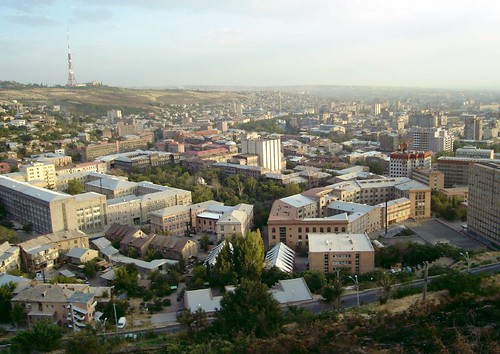-
Armenia Celebrates Victory Day
By Maryna Polataiko for postcommunistmonuments.ca
Photo: Armenian Genocide Monument
While countries such as Ukraine and Uzbekistan are using the 70th anniversary of Nazi Germany’s defeat to spurn ties with Russia, Armenia is celebrating the occasion and is—simultaneously—strengthening ties with its former Soviet ringleader.
Earlier this spring, members of the CIS Inter-Parliamentary Assembly joined the Vice President of the Armenian National Assembly Hermine Naghdalyan in the “Memory Baton” ceremony honouring the anniversary. Drawing fire from the eternal flame in Yerevan, Russian delegates traveled back to Russian with the Armenian torch in order to add fire to a flame in St. Petersburg, where all the CIS members’ fires collide.
On March 30, Chairman of the Russian State Duma Sergey Naryshkin arrived in Armenia for a tree-planting ceremony at the new Alley of Victory (located at the Armenian-Russian University) and was joined by Armenian Speaker of the National Assembly Galust Sahakyan. This event symbolized friendly relations between both states. Following the ceremony, a forum honouring the Great Victory took place. There, Shakyan drew parallels between the 70th anniversary of the Nazi defeat and the centennial of the Armenian genocide.
Among other events, resources have been allocated to erecting and maintaining monuments honouring the War.
In Russia, an Armenian temple in Moscow was blessed by Archbishop Yezras Nersisyan (Russian and Novo-Nakhchivan Eparchy of the Armenian Apostolic Church) to commemorate soldiers from the World Wars.
Joint parades of Russian and Armenian soldiers are scheduled to take place May 9 in Gyumri and Yerevan.
[SOURCES:]
“Armenia to Celebrate Victory in Great Patriotic Was at a High Level—Government.” ARKA News Agency, March 30, 2015. Accessed April 2, 2015. http://arka.am/en/news/politics/armenia_to_celebrate_victory_in_great_patriotic_war_at_a_high_level_government/.
“Armenian and Russian Parliamentary Speakers Participated in Forum Devoted to Victory in Great Patriotic War.” Armenpress, March 30, 2015. Accessed April 2, 2015. http://armenpress.am/eng/news/799737/armenian-and-russian-parliamentary-speakers-participated-in-forum-devoted-to-victory-in-great-patriotic.html.
http://armenpress.am/eng/news/798917/armenia-also-joined-great-patriotic-war-memory-baton.html
“Armenia Also Joined Great Patriotic War ‘Memory Baton.’” Armenpress, March 24, 2015. Accessed April 2, 2015. http://armenpress.am/eng/news/798917/armenia-also-joined-great-patriotic-war-memory-baton.html.
http://vestnikkavkaza.net/news/society/68431.html
“Marathon of Memory Reaches Armenia.” Vestnik Kavkaza, March 25, 2015. Accessed April 2, 2015. http://vestnikkavkaza.net/news/society/68431.html.
“CIS Inter-Parliamentary Assembly Members Pay Floral Tribute to World War II Victims in Victory Park in Yerevan.” ARKA News Agency, March 24, 2015. Accessed April 2, 2015. http://arka.am/en/news/society/cis_inter_parliamentary_assembly_members_pay_floral_tribute_to_world_war_ii_victims_in_victory_park_/.
http://vestnikkavkaza.net/news/society/69826.html
“Spot for Armenian Temple Blessed on Moscow’s Poklonnaya Hill.” Vestnik Kavkaza, April 20, 2015. Accessed April 20, 2015. http://vestnikkavkaza.net/news/society/69826.html.
http://www.panorama.am/en/press/2015/04/16/hzh2/
“Haykakan Zhamanak: Armenian and Russian Servicemen to Conduct Parades in Yerevan and Gyumri.” Panorama, April 16, 2015. Accessed April 20, 2014. http://www.panorama.am/en/press/2015/04/16/hzh2/.
“Memory Alley Dedicated to 70 Anniversary of Soviet People’s Victory over Nazis Opened in Yerevan.” ARKA News Agency, April 3, 2015. Accessed April 12, 2015. http://arka.am/en/news/politics/memory_alley_dedicated_to_70_anniversary_of_soviet_people_s_victory_over_nazis_opened_in_yerevan/.
-
A Statue to Mikoian?
- May 28, 2015 - 11:04 pm
- Armenia
- Comments Off on A Statue to Mikoian?
By Maryna Polataiko for postcommunistmonuments.ca
Eliciting public scorn, Yerevan Mayor Taron Margarian authorized the installation of a statue depicting Soviet-era politician Anastas Mikoian. The former statesman—whose career peaked when he briefly occupied the position of Chairman of the Presidium of the Supreme Soviet—was a supporter of Stalin, and is known for his involvement in the purges of the 1930s. In light of Mikoian’s recommendations to execute hundreds of Armenians, and his disregard for the 1915 Ottoman massacre, the name of Anastas Mikoian is met with scorn and derision.
In response, Armenian activists are calling the monument offensive, and are collecting signatures for a petition supporting its removal. Indeed, Yerevan’s pro-Soviet City Council decision is seen by many as a political maneuver paying court to Putin in response to Armenia’s imminent alignment with a Customs Union helmed by Russia.
Mayor Margarian however, countered the backlash by asserting that the inspection of Mikoian’s contentious misdeeds should be left in the hands of historians.
[SOURCES:]
http://www.eurasianet.org/node/68400
Marianna Grigoryan. “Armenia: Controversial Communist to Get Statue in Yerevan?” Eurasianet.org, May 23, 2014. http://www.eurasianet.org/node/68400.
http://asbarez.com/122737/yerevan-government-plans-statue-to-soviet-leader/
“Yerevan Government Plans Statue to Soviet Leader.” Asbarez.com, May 6, 2014. Accessed September 30, 2014. http://asbarez.com/122737/yerevan-government-plans-statue-to-soviet-leader/.
https://iwpr.net/global-voices/stalins-man-mikoyan-get-statue-yerevan
Poghosyan, Yekaterina. “Stalin’s Man Mikoyan to Get Statue in Yerevan.” Global Voices Caucasus, May 29, 2014. Accessed January 18, 2015. https://iwpr.net/global-voices/stalins-man-mikoyan-get-statue-yerevan.
-
Special Issue of Nationalities Papers on Post-Socialist Cities
- September 13, 2013 - 3:12 pm
- Armenia, Estonia, Hungary, Kazakhstan, Kyrgyzstan, Mongolia, Romania, Russia
- Comments Off on Special Issue of Nationalities Papers on Post-Socialist Cities
The September 2013 issue of Nationalities Papers features articles on national identity and the post-socialist city. Link (gated) is here.
The editors, Alexander C. Diener and Joshua Hagen, provide an excellent introductory essay to the special issue. Here's the abstract:
From socialist to post-socialist cities:narrating the nation through urban spaceThe development of post-socialist cities has emerged as a major field of study among critical theorists from across the social sciences. Originally constructed under the dictates of central planners and designed to serve the demands of command economies, post-socialist urban centers currently develop at the nexus of varied and often competing economic, cultural, and political forces. Among these, nationalist aspirations, previously simmering beneath the official rhetoric of communist fraternity and veneer of architectural conformity, have emerged as dominant factors shaping the urban landscape. This article examines patterns, processes, and practices concerning the cultural politics of architecture, urban planning, and identity in the post-socialist city. In addition to assessing the main contours of this burgeoning field of research, this article highlights how this special issue of Nationalities Papers contributes to a broader understanding of contemporary cultural and political change in post-socialist urban settings.



